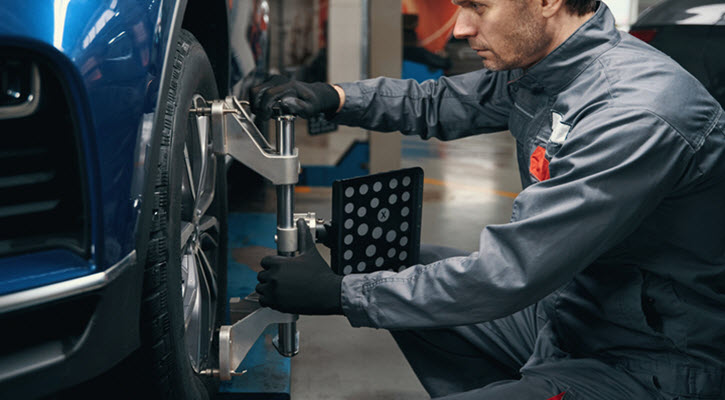Your Audi, with its blend of performance and luxury, relies on a symphony of components to deliver a smooth and exhilarating driving experience. Among these crucial elements are your tires, the literal foundation of your journey on the road. To ensure optimal performance, extending the life of your tires, and maintaining the handling precision synonymous with Audi, regular tire alignment and rotation are essential. However, many Audi owners ask: How often should you get your Audi’s tires aligned and rotated?
The Basics of Tire Alignment
Tire alignment, also known as wheel alignment, is the adjustment of the angles of your Audi’s wheels to meet the manufacturer’s specifications. Proper alignment ensures that your tires make contact with the road surface evenly, promoting even tire wear, stable handling, and fuel efficiency. Misaligned tires can lead to uneven tread wear, compromised handling, and an overall reduction in driving comfort.
Signs Your Audi Needs Alignment
- Uneven Tire Wear: Inspect your tires regularly for signs of uneven wear, which could indicate misalignment.
- Vehicle Pulls to One Side: If your Audi tends to drift or pull to one side, even when driving on a straight road, it’s a sign of potential alignment issues.
- Steering Wheel Off-Center: An off-center steering wheel when driving straight is an indicator that your wheels may need alignment.
- Vibrations or Shaking: Vibrations or shaking through the steering wheel can be a result of misaligned wheels.
Frequency of Tire Alignment for Audi Vehicles
While Audi vehicles are engineered for precision and performance, they are not immune to the forces that can knock wheels out of alignment. As a general guideline, Audi owners should consider getting their tires aligned:
- Annually: An annual alignment check is a proactive approach to catching any potential issues early. Regular checks help maintain optimal handling and prevent uneven tire wear.
- After Significant Impact: If your Audi experiences a significant impact, such as hitting a pothole or a curb, it’s advisable to have the alignment checked immediately. Even seemingly minor incidents can have an impact on wheel alignment.
- When Replacing Tires: Whenever you invest in a new set of tires, it’s a good time to have the alignment checked. Proper alignment ensures that your new tires wear evenly and last longer.
- Suspension or Steering Repairs: If your Audi undergoes suspension or steering system repairs, a subsequent wheel alignment is recommended to ensure that the adjustments align with the manufacturer’s specifications.
The Role of Tire Rotation
Tire rotation is the practice of moving tires from one position to another on your Audi. Since different positions on your vehicle subject tires to different types of wear, rotation helps balance this wear, ensuring that all tires wear uniformly.
Signs Your Audi Needs Tire Rotation
- Uneven Tread Wear: If you notice that the tread on your tires is wearing unevenly, it’s a strong indicator that your tires may benefit from rotation.
- Vibration or Pulling: Uneven wear can lead to vibrations or pulling to one side, affecting the overall stability and handling of your Audi.
Frequency of Tire Rotation for Audi Vehicles
The frequency of tire rotation depends on several factors, including your Audi model, driving habits, and the type of tires you have. As a general rule of thumb:
- Every 6,000 to 8,000 Miles: Audi generally recommends tire rotation every 6,000 to 8,000 miles. This interval is a good starting point, but it’s essential to check your vehicle’s manual for model-specific recommendations.
- With Regular Maintenance: Tie tire rotation to your Audi’s regular maintenance schedule. When you take your vehicle in for oil changes or other routine services, ask your technician to include tire rotation.
- Tire Type Considerations: If your Audi is equipped with different tire sizes on the front and rear axles, or if you have directional tires, the rotation pattern may vary. Consult your vehicle’s manual or a professional technician for guidance.
The Benefits of Regular Tire Maintenance
Investing in the regular alignment and rotation of your Audi’s tires offers a range of benefits that go beyond the immediate advantages of even wear and precise handling.
- Extended Tire Life: Proper alignment and rotation help distribute wear evenly across all tires, extending their overall lifespan and maximizing your investment.
- Improved Fuel Efficiency: Even tire wear contributes to improved fuel efficiency. Tires that roll smoothly with minimal resistance enhance your Audi’s gas mileage.
- Enhanced Handling and Safety: Precise wheel alignment ensures optimal handling and stability, contributing to your Audi’s overall safety on the road.
- Smoother Ride: A well-maintained tire system translates to a smoother and more comfortable driving experience, characteristic of the luxury and performance associated with Audi.
Tire Care at European Service Center
Whether you need your tires aligned, rotated, or both, our skilled service technicians are ready to help. We are proud to serve drivers from Alpharetta, Chamblee, Cumming, Norcross, Duluth, Dunwoody, Buckhead, Roswell, Atlanta, GA; Houston and Dallas, TX. Call or stop by today to get your tires in the best shape possible and improve your Audi’s ride!


